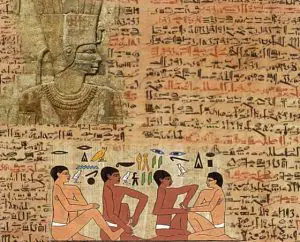How Ancient Egyptian Diseases Influenced Life Expectancy of Ancient Egyptians
Egyptian Diseases
Ancient Egyptian diseases sparked off a revolution in ancient medicine which is the very basis of many modern medical inventions. The influence of the environment and the River Nile was profound in ancient Egypt.

As the Nile provided water to people and fertility to the soil, it was considered a life sustaining source. The water from the Nile River was used for cooking, drinking, and cleaning. But the downside to this was that ancient Egyptian diseases started from the Nile. While the Nile was a heaven of life sustenance, it was also a haven of parasites.
Water-Borne Diseases in Ancient Egypt
When passing through the Nile, people were affected by the Schistosoma worm. This worm entered the body through the wader’s feet and attacked the internal organs of the person. What resulted was severe health problems and decreased immunity for people affected by this worm.
Drinking water was unfiltered and un-boiled. Guinea worms would enter the bodies causing fatal health problems. Egyptians countered this initially by eating healthy food such as vegetables, milk, and meat. Yet, they were severely affected by water-borne diseases that made no use of their strong nutritional levels.
Archaeological and scientific carbon dating techniques have indicated that ancient Egyptians suffered from headaches, emotional disorders, and even alcoholism. These are modern health conditions. The discovery has proven that such conditions existed even thousands of years ago.
Tomb paintings also indicated that people suffered from eye problems due to dust and sand flies. Although it is difficult to predict the extent of these conditions, it does indicate that ancient Egyptian people did suffer from these maladies.
Life Expectancy Levels Due to Diseases in Ancient Egypt
Quite surprisingly, the life expectancy of people in ancient times was very low. The average life expectancy was just about forty years of age. Considering that modern day people had medical inventions to support their longevity, ancient people were victims of many diseases.
Although King Tutankhamen was just eighteen years of age when he died, he was still considered mature at that time. During that time, eighteen years of age was enough for someone to be crowned as king and overlook the responsibilities of managing the kingdom.
Scriptures regarding diseases in ancient Egyptian indicate that hundreds of women died during childbirth. Egyptians were the first to come with the idea of contraception. They experimented using the excreta of crocodile, honey, and oil to control or flourish their population.
Even during that time, the concept of children was to look after their parents when they became old. Given this fact, Egyptian women were expected to have many children. This would have lead to pregnancy complications and subsequent fatality of such women.
But the auguring of the twentieth century, a lot of these practices becoming obsolete. Ancient Egyptian diseases were a thing of the past, as people looked forward to a happier future.
